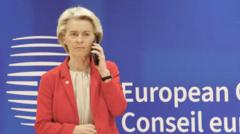The ruling from the EU Court of Justice could have serious implications for Malta and its citizenship by investment scheme.
Malta's Golden Passport Scheme Violates EU Law, Court Affirms

Malta's Golden Passport Scheme Violates EU Law, Court Affirms
EU's top court deems Malta's financial citizenship program a breach of European legal standards.
The European Union's top court has ruled that Malta's controversial "golden passport" scheme, which allows foreigners to acquire citizenship through significant financial investment, violates EU law. This ruling follows a legal challenge brought by the European Commission in 2022, arguing that the scheme enables the sale of EU citizenship, undermining the integrity of member states' nationalities.
As part of the scheme, individuals could gain Maltese citizenship—and thus the ability to live and work throughout the EU—by investing at least €600,000 (£509,619), purchasing or renting property of a specified value, and donating €10,000 to charitable causes. The Court of Justice characterized this arrangement as effectively reducing the acquisition of nationality to a mere commercial transaction rather than a reflection of genuine ties to Malta.
In response to the ruling, former Prime Minister Joseph Muscat claimed the decision was politically motivated and hinted that the scheme could be modified to align more closely with EU standards still allowing its continuation. Meanwhile, Malta risks significant fines if it fails to comply with the court's decision, emphasizing the urgency of the matter.
Despite the court’s ruling, Malta has defended its program, stating that its understanding of EU treaties permits such practices. The court's finding poses a significant challenge to Malta's insistence on its legality, as it jeopardizes the mutual trust that underpins relationships among EU member states.
Investor citizenship schemes have faced increasing scrutiny over their potential associations with security risks, money laundering, tax evasion, and corruption. The EU has previously urged its members to dismantle such programs, signaling a growing apprehension over their implications for the continental bloc. The latest ruling is a critical moment in an ongoing debate about the intersection of investment and nationality within Europe.



















